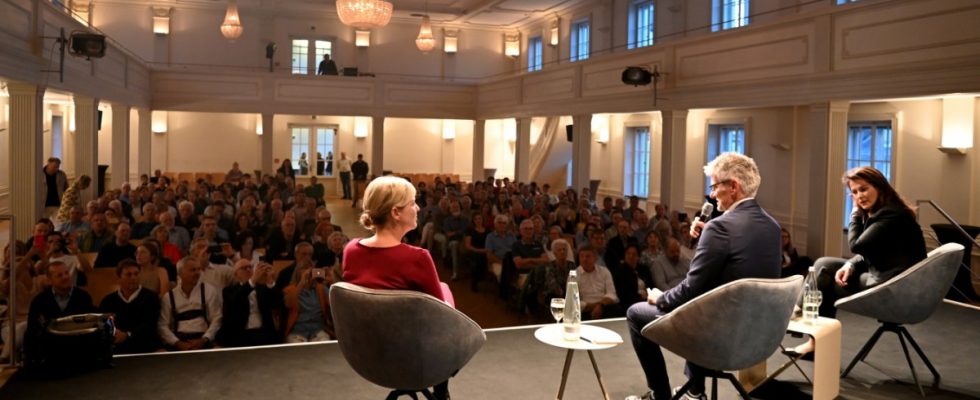The two women sit barely three meters apart on the podium, but in the public eye shortly before the state elections on October 8th, they could be seen as representatives of two opposing poles in state politics. Here is Michaela Kaniber, CSU, State Minister for Food, Agriculture and Forestry, who in the cabinet has to primarily look after Bavaria’s farmers and whose department the country already has in its name. There Katharina Schulze, together with Ludwig Hartmann, parliamentary group spokeswoman for the Greens in the state parliament and opposition leader in Bavaria, whose Munich-Milbertshofen constituency also includes western Schwabing.
In the city of Munich, the Greens were already the strongest party in the election five years ago. In Kaniber’s Berchtesgadener Land constituency they were in second place with 16.4 percent, but far behind the CSU’s 42.6 percent. There in the country, some people are busy working with the milking machine in the stables early in the morning, while others in the city later sip their latte macchiato and think about how they can make life even more difficult for the people living in the countryside. This is how the political situation is often described – especially by those who expect something from it. But does it really exist, this alleged culture clash between city and country? Or between country and city, to name the country first for once? The SZ wants to know this in more detail – on Thursday evening from Michaela Kaniber and Katharina Schulze in person.
Sometimes the two politicians get a little close to each other on the podium, often to the audible delight of the around 200 visitors in the well-filled stucco hall of the Rosenheim Ballhaus. But they won’t be able to agree on what needs to change in Bavaria, when, how quickly and how exactly. It is often less the opposition leader who appears to be more aggressive than the minister.
If the Greens have their way, people in Germany should be able to choose their gender once a year, but not their heating system. This is how Kaniber puts it in one of her few, but quite sudden, violent attacks – in this case as a late answer to a question from moderator Sebastian Beck. The head of the SZ Bavaria editorial team wants to know from both women whether they are capable of forming a coalition with each other, and receives the more state-supporting answer from Schulze: “The times are too serious to rule out a possible coalition with another democratic party before an election.”
The audience tends to reward Schulze’s authoritative demeanor
However, a few years ago it was a little more likely that the incumbent Prime Minister and CSU leader Markus Söder would talk to Schulze’s Greens about forming a government after October 8th than at the moment. In the current election campaign, the CSU is striving for confrontation and demarcation, and with it Michaela Kaniber on the podium in Rosenheim.
A goal of 30 percent organic farming in Bavaria, as the Greens wrote in their election program? “For me, this is absolute madness,” says the Agriculture Minister, who prefers to place her main emphasis on regionality and accuses Schulze’s Greens of wanting to patronize people when it comes to food and of often banning meat and even fish from daycare centers and school canteens in municipalities. Schulze contradicts this. “Everyone should eat what he or she wants” – and the children in daycare centers and schools should preferably eat fresh, not pre-prepared food, which farmers could also make a good living from. Both agree that politicians must try to create a sales market for organic products in order to support farmers in the transition.
The two women are less than three meters apart at the podium, but politically they are often far apart.
(Photo: Stephan Rumpf)
This was Kaniber’s answer to a question from the audience about which position of the other they liked. Overall, the listeners in the Ballhaus tended to reward Schulze’s more authoritative appearance with applause, but she was able to mobilize more of her own supporters for the appearance in the 65,000-inhabitant city of Rosenheim than the CSU minister, who was more likely to receive support from a few farmers and mayors the environment is supported. The more local questions revolve around things like the lack of internet access on the train between Rosenheim and Munich or the attitude of the two politicians to the Brennern north flow, which is always an explosive issue for federal and state politicians in the Rosenheim area, including within the party. In the Ballhaus, Schulze is clearly committed to two additional tracks towards the Brenner, while Kaniber prefers to talk about support for affected farmers.
When it comes to the topic of immigration, which has recently been discussed with new urgency by the CSU, Kaniber points to Berlin. The fact that Ukrainians who fled to Germany now receive citizen’s money “takes away motivation to work.” Bavaria wants to rely on benefits in kind again for refugees from other countries. “Moving to a welfare state in Germany cannot be the right path,” says Kaniber, receiving some applause. Schulze, on the other hand, would prefer to integrate refugees “quickly and get them into the job market quickly.” The state government also has to do more “than just say on the talk show what’s not possible.”
But the listeners can also take away from the conversation in Rosenheim what, from Kaniber’s point of view, is unlikely to be possible, namely a coalition with the Greens. Schulze, on the other hand, tries to present a minimal perspective on government participation: “It would be possible to combine the best of both worlds here.”

